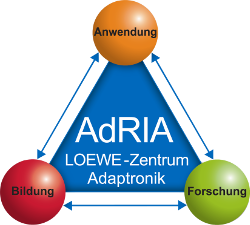 | Dr.-Ing. Andreas Engel | ||
|---|---|---|---|
| Technical University Darmstadt | |||
| Computer Science Institute | |||
| Embedded Systems and Applications Group | |||
| Hochschulstr. 10 | |||
| D-64289 Darmstadt | |||
| Phone: +49 6151 / 16-22430 | |||
| Fax: +49 6151 / 16-22422 | |||
| E-Mail: |  | ||
| S2/02 (Piloty building), Room E106 | |||
- Duration
- 09/2015 - 02/2018
- Funded by
- Bundesministerium für Bildung und Forschung (KMU innovativ)
- Funded budget
- 416 kEUR
- Consortium
- iXtronics Mechatronics, Tools & Technologies GmbH
- Ziegler Instruments GmbH
- Hella KGaA Hueck & Co
- Fachgebiet Rechensysteme, TU Darmstadt
- Fachgebiet Eingebettete Systeme und ihre Anwendungen, TU Darmstadt
- Project description
UltraSynth tackles these problems by an innovative solution. Models of control algorithms are scheduled on a Coarse-Grain Reconfigurable Architecture (CGRA), which itself is executed on the SoC-FPGA. By reducing the degrees of freedom of the reconfigurable architecture, the hardware synthesis duration is reduced from hours to seconds without loosing the adaptability over a broad spectrum of applications. The productivity, reactivity, and thus the predictability and quality of the product development process is thus enhanced significantly. To dissiminate the project results, iXtronics integrates the ultrafast synthesis and the optimized hardware components develeped at TU Darmstadt as a new toolbox of its CAMeL-View development environment for model-based complex technical systems.
- Duration
- 07/2008 - 06/2014
- Funded by
- Hessische Landes-Offensive zur Entwicklung Wissenschaftlich-ökonomischer Exzellenz
- Funded budget
- 41,4 MEUR
- Consortium
- Fraunhofer Institut für Betriebsfestigkeit und Systemzuverlässigkeit LBF
- TU Darmstadt
- Fachgebiet Datenverarbeitung in der Konstruktion
- Institut für Produktionsmanagement, Technologie und Werkzeugmaschinen
- Institut für Produktionstechnik und Umformmaschinen
- Fachgebiet Systemzuverlässigkeit und Maschinenakustik
- Institut für Druckmaschinen und Druckverfahren
- Miktrotechnik und Elektromechanische Systeme
- Mikroelektronische Systeme
- Fachgebiet Regelungstechnik und Mechatronik
- Fachgebiet Eingebettete Systeme und ihre Anwendungen
- Deutsches Kunststoff-Institut
- Nichtmetallisch-Anorganische Werkstoffe
- Fachgebiet Dünne Schichten
- Fachgebiet Elektronische Materialeigenschaften
- Fachgebiet Disperse Feststoffe
- Fachgebiet Oberflächenforschung
- Fachgebiet Materialanalytik
- Fachgebiet Materialmodellierung
- Institut für Angewandte Geowissenschaften
- Hochschule Darmstadt
- Fachbereich Maschinenbau und Kunststofftechnik
- Project description
- The LOEWE center AdRIA (Adaptronik - Research, Innovation, Application) investigates the research and technology aspects of adaptronic applications in depth, to achieve the systematic and holistic development of adaptronic products with high market maturity. Adaptronic concepts will enable a sustainable and consistent lightweight construction of technical structures with high energy efficiency over the whole life cycle. At the same time, the functionality (e.g., by integrated active safety and monitoring systems) and performance (e.g., precise, quiet and low-vibration) of these structures will be advanced. To achieve these goals, basic research and the technology development within AdRIA will be be broken down into well defined technology areas and orthogonal key project driven by cross-cutting technology demonstrators. The setup phase (year 1 to 3) will focus on fundamental technology areas, while the operating phase (year 4 to 6) will focus on the application specific key projects. Within the technology areas, innovative topics of strategic importance for adaptronic applications will be driven to a high and homogeneous technology readyness level to demonstrate their market potential in the key projects. On the long run, this project will establish adaptronics as a key technology for the mass market production and strengthen the sustainable development of the adaptronic location Darmstadt. All required technologies and technological innovations will be advanced for the main technology demonstrators adaptive car, silent office and adaptive dampers, until prototype realizations of complete adaptronic systems can be realized. The research interests of the LOEWE center AdRIA are derived from these goals and observations:
- Preparation of an efficient development environment for the design of adaptronic systems,
- Development of new, application-specific transducer materials,
- New concepts for sensors and actuators allowing for deep integration into adaptronic systems,
- Economical, compact and robust solutions for the electronic components of adaptive systems,
- Innovative control concepts for complex systems with broadband interference,
- Economical and flexible production processes for small and large series,
- Methods for monitoring and assessment of system reliability,
- Demonstration of the market maturity of adaptronic systems for selected examples.


